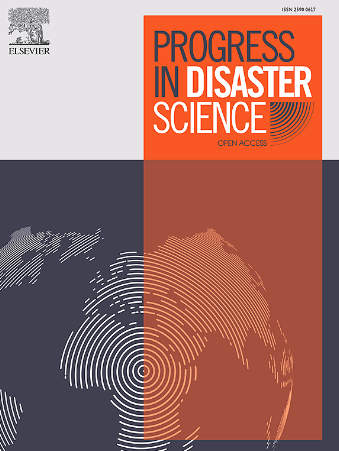Enhancing resilience to climate change: Addressing cascading risks within the energy, water and food nexus
IF 3.8
Q3 ENVIRONMENTAL SCIENCES
引用次数: 0
Abstract
The growing global demand for energy, water, and food presents a challenge to sustainable development. This challenge is further intensified by the expanding human population and the rapid pace of industrialization, which together exert intense pressure on these essential resources. Recent trends indicate a significant increase in energy usage, and it is expected that water and food requirements will also increase. Such pressures highlight the critical need to understand and manage the interconnected nature and associated risks, including cascading risks, within the energy, water, and food sectors. This study delves into the relationship between climate change risks and the Energy-Water-Food (EWF) nexus, assessing the diverse impacts of risk categories on distinct sectors. Furthermore, it expands on the concept of cascading risks, an area often overlooked, across two primary dimensions: hazards, which can evolve into cascading and compound hazards; and systems, where failures can propagate between interdependent systems or even within their own boundaries. Building on the reviewed concepts, a framework is proposed to quantify cascading performance within EWF nexus considering the dynamic interactions of the involved elements to reinforce their resilience.
加强对气候变化的适应能力:应对能源、水和粮食关系中的级联风险
全球对能源、水和粮食日益增长的需求对可持续发展提出了挑战。人口的增加和工业化的迅速发展使这一挑战进一步加剧,它们共同对这些基本资源造成巨大压力。最近的趋势表明能源的使用显著增加,预计对水和粮食的需求也将增加。这些压力凸显了理解和管理能源、水和食品部门相互关联的性质和相关风险(包括级联风险)的迫切需要。本研究探讨了气候变化风险与能源-水-食物(EWF)关系,评估了不同风险类别对不同行业的不同影响。此外,它扩展了级联风险的概念,这是一个经常被忽视的领域,涉及两个主要方面:危害,可以演变成级联和复合危害;在系统中,故障可以在相互依赖的系统之间传播,甚至在它们自己的边界内传播。在回顾概念的基础上,提出了一个框架来量化EWF关系中的级联性能,考虑到相关元素的动态相互作用,以增强其弹性。
本文章由计算机程序翻译,如有差异,请以英文原文为准。
求助全文
约1分钟内获得全文
求助全文
来源期刊

Progress in Disaster Science
Social Sciences-Safety Research
CiteScore
14.60
自引率
3.20%
发文量
51
审稿时长
12 weeks
期刊介绍:
Progress in Disaster Science is a Gold Open Access journal focusing on integrating research and policy in disaster research, and publishes original research papers and invited viewpoint articles on disaster risk reduction; response; emergency management and recovery.
A key part of the Journal's Publication output will see key experts invited to assess and comment on the current trends in disaster research, as well as highlight key papers.
 求助内容:
求助内容: 应助结果提醒方式:
应助结果提醒方式:


